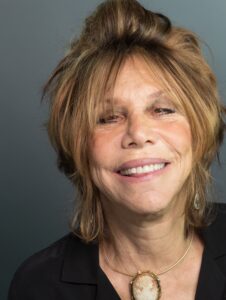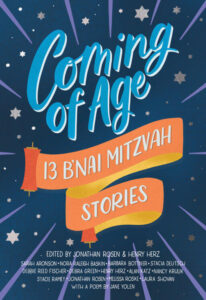COMING OF AGE: 13 B’NAI MITZVAH STORIES (Albert Whitman & Company, 2022) is a wonderful anthology celebrating the important rite of passage in the Jewish community. Edited by Henry Herz and Jonathan Rosen, the range of stories will engage readers with both familiar and new experiences represented in the short stories.
According to co-editor, Jonathan Rosen, “The project was developed to combat hatred. Reading helps build bridges. It gives us an entry point into other worlds, communities, and beliefs. Perhaps, by gaining a little more understanding, better relations will happen. Over the last eight years, the number of anti-Semitic attacks in the United States has steadily risen. While this book isn’t going to cure anti-Semitism—even though a portion of the proceeds is going to go to organizations that will help fight it—what this book will do is bring some fun Jewish stories into your hands. The hands of readers. Not only is it important for Jewish kids to be able to see themselves and their experiences in books, but it’s also good to have non-Jewish kids see that Jewish kids aren’t so different from them after all. Reading helps build bridges. So maybe, just maybe, it can all start with a book.”
Participating authors are Sarah Aronson, Nora Raleigh Baskin, Barbara Bottner, Stacia Deutsch, Debbie Reed Fischer, Debra Green, Henry Herz, Alan Katz, Nancy Krulik, Stacie Ramey, Jonathan Rosen, Melissa Roske, and Laura Shovan, with a poem by Jane Yolen.
I am honored to chat with acclaimed author Barbara Bottner about her short story contribution to the anthology, THE SECOND EVER BAT MITZVAH OF NEW YORK CITY.

How did you come to contribute to the COMING OF AGE anthology and what did it mean to you to be included?
I met Henry Herz when he invited me to participate at a conference a few years back; we immediately connected. I’d always wanted to write something as a Jewish author, but nothing I’d published reflected that. I’ve tried to add a sense of our culture in some of the picture books I’ve done, but that was contextual only. When Henry told me of his project, it wasn’t yet under contract, but I was keen to sign on. Then, Whitman bought it. The deadline somehow escaped me and I discovered the manuscript was suddenly due! I often write from my own life, so that’s where I looked first, but my own Bat Mitzvah offered nothing interesting. I’m embarrassed to admit this, but I tried to squirm out of my commitment. Luckily, Henry offered to brainstorm. He asked a question about what era interested me. I’d been in Off Broadway theater in New York City and actually lived in the lower east side. The Jewish Rialto was famous and some of the same restaurants were still there when I was rehearsing at places like LA Mama and Theater Genesis. The minute the era became clear my brain engaged; there was something about those times that would fascinate me in a new way. Also, to some of us true believers, the theater is sacred. So there was a link to the ritual of a bat mitzvah.
What inspired your charming short story, THE SECOND EVER BAT MITZVAH OF NEW YORK CITY?
I often begin with character. It’s how I locate the voice of a piece, which is a natural guide for me. I conceived of this theater family and the young narrator who’s unlike her mother and aunts, all natural actresses. But Hannah’s shy. Backstage, she’s a genius but she’s terrified of performing. This is exactly how I got into acting; I did sets at first; my training was in art. At some point, my paintings overpowered the actors—there were complaints! This is when I got an inkling that maybe I wanted to be out there myself, although I was not trained. So, that part is autobiographical. I liked creating the internal conflict that this character has ambitions—to do a good job at her Haftorah—but is held back by her timidity. Naturally, I also wanted the piece to have some content of what the torah portion was as well, so I went off reading the various haftorah’s that specifically dealt with how women are portrayed. I found one that seemed to work with the larger themes; Hannah is concerned about her future, entering the world as a female. At this point, I was deeply committed to the process of discovery, and was grateful that my actual bat mitzvah had nothing to offer in terms of fiction.
You reference Judith Kaplan, the first Bat Mitzvah of NYC. Your character, Hannah is encouraged to be the next. Why do you think this would be important to her family?
I was stunned to learn that Bat Mitzvah’s were not happening in this country until 1921. As I saw this theatrical family who owned their own building, I loved that the grandfather would be more religious than his younger daughters. He would be carrying the tradition and the connection to the teachings. He would not be strict but inspiring, and he would want to help Hannah embrace her heritage. I am a lapsed Jew but am grateful I had a bat Mitzvah’ I’m grateful that I had grounding in my own faith. As far preparation, there is a payoff: a specific event, not just some never ending study to be endured. There’s a line somewhere in my piece about how Jews have always told stories. That’s the connection: both the theater and the Torah tell stories. Stories, of course, enable us to make sense of the world. I liked writing that the 2nd bat mitzvah would be nothing like the more conservative upper east side celebration of Judith Kaplan. I felt that Hannah’s less conventional, artistic family would still respect this age-old tradition in a young woman’s life. The study of the haftorah connects us to our history, our beliefs, our morality, and gives us a way to steer into the future–if we take it seriously. It’s a wonderful platform with which to introduce everyone into Judaism, no matter from what belief system they may have. I applaud Henry and Jonathon for originating this idea.

The Yiddish Theatre, as well as the history of New York City, are important to Hannah’s story. Did you need to do research?
I definitely did. I loved remembering the great Yiddish actors that made the Yiddish theater in New York such an important transmission of Jewish life as Jews immigrated here from Europe. I’ve done other stories set in this era—a screenplay—so I’d already been familiar with the territory. The Triangle Shirtwaist Factory fire happened only ten years previously, when Hannah would have been three. That era in New York history was fascinating; it was a bustling time, when poor Jews found ways to found businesses and professions, learn English, join unions, escape from tenements but also speak in their Yiddish tongue and help their cousins and families gain a foothold in the new country. Families were often more connected than they are today; they lived near each other and relied on each other They provided a sense of belonging for each other while trying to fit into America as greenhorns. There is such beauty in that era for those reasons. Hannah is lucky to grow up inside this tightly knit fabric of support, even as she must discover for herself who she is going to be as a young Jewish woman in a culture that would present many challenges for both those reasons. The story indicates that she will be able to conquer her shyness and experience the “ah ha” moment of going on stage as a performer. I loved living inside this world. And, like Hannah, I was terrified to go onstage. But I did it when I was young. We toured Europe, appeared in the West End in London. I was never a real natural onstage, by the way, but I had the time of my life.
What do you hope readers come away with after reading your story, as well as the whole anthology?
As a collection, this is an invaluable offering to demystify what this rite of passage means for Jewish children. And it’s an invitation to non-Jews to learn why we still carry it on today. Coming of Age is a panoramic approach, with so many authors participating. I think welcoming non-Jews into our world is important now more than ever as we encounter the ugly face of anti-Semitism. As a country, we’ve gotten so much wrong about religion. Coming of Age is a wonderful antidote to the ‘othering’ that plagues us.
As far as my story is concerned, I tried to create a flesh and blood girl with her own psychological and social baggage and force her to hunt for wisdom in the Torah as well as her own inner wisdom and her desire to overcome her fears. At that age, we are a fear sandwich, so that is a universal starting point to identify with another person. And a great and universal challenge to everyone entering adulthood.
Thank you, Barbara!